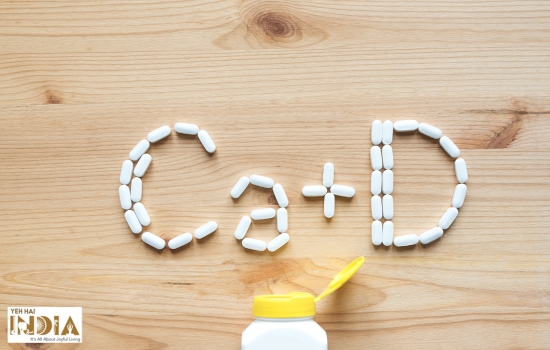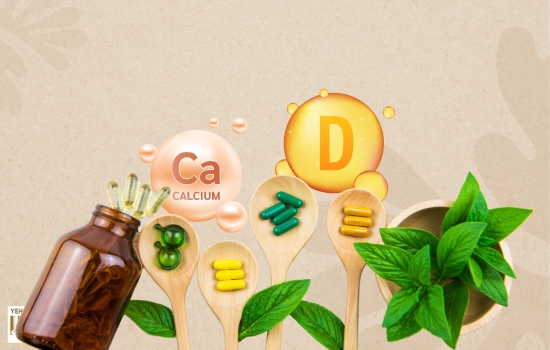Calcium and Vitamin D supplements play an important role in overall health and well-being. Ca is essential for the development and maintenance of strong bones and teeth, as well as for various physiological functions.
Calcium is necessary for healthy bones, and vitamin D aids in calcium absorption and utilisation. They work together to promote bone health, prevent disorders such as osteoporosis, and contribute to good muscular function.
Adequate calcium and vitamin D levels are also beneficial to menstruation health, pregnancy, and nursing. Incorporating these supplements into a well-balanced diet can aid in nutrient absorption and enhance overall well-being.
Dairy items such as milk, cheese and yoghurt, as well as leafy green vegetables, tofu, & almonds, are high in Calcium. Vitamin D may be derived from fatty fish such as salmon and mackerel and fortified dairy products, egg yolks. Natural sunshine, however, increases vitamin D production in the skin.
Recommended Article: Evaluating Supplement Claims and Selecting Safe Products: A Detailed Guide
Role of Calcium

Calcium is an important component of bones since it provides strength and structure.
- Calcium is required for muscles to move and nerves to communicate between your brain and the rest of your body.
- It is essential for blood clotting, which helps prevent excessive bleeding and activates clotting factors.
- It is also necessary for hormone production and activity, regulating metabolism, blood pressure, and neuron activity.
- Calcium also plays an important role in the activation and activity of enzymes, promoting overall metabolic activity.
How does Vitamin D aid in Calcium Absorption in the Body?

Vitamin D is a fat-soluble vitamin that is essential for calcium absorption and utilisation in the body.
It improves calcium absorption from the intestines, controls its concentration in the blood, and stimulates its deposition in the bones. Thereby, improving bone health.
- Vitamin D increases intestinal calcium absorption by promoting the production of calcium-binding proteins.
- Maintains calcium homeostasis by regulating absorption, reabsorption, and release, ensuring that calcium is accessible for vital human activities.
- Vitamin D, in conjunction with calcium, promotes bone mineralization. It allows calcium and phosphorus to be incorporated into the bone matrix, strengthening bones and reducing fracture risk.
- Prevents calcium deficiency by promoting calcium reabsorption in the kidneys.
- Regulates calcium levels by affecting PTH secretion and function.
Potential Benefits of Combining Calcium and Vitamin D Supplements
To maximise the beneficial effects of promoting health, a combination of calcium and vitamin D supplementation works wonders and offers several potential benefits.
Potential Benefits Explanation Enhanced Calcium Absorption Vit D helps improve the absorption of calcium from the intestines, maximizing its utilization by the body. Improved Bone Health The combination of calcium and vitamin D promotes optimal bone density, reduces the risk of fractures, and helps prevent osteoporosis. Enhanced Muscle Function Vit D supports muscle strength and coordination, contributing to overall mobility and balance. Immune System Support Vit D may have immune-modulating effects, potentially aiding in the maintenance of a healthy immune system. Over-all Health Benefits Adequate intake of calcium and vitamin D is associated with a lower risk of chronic diseases like cardiovascular disease, type 2 diabetes, and certain types of cancer.
It’s important to note that the benefits of combining supplements vary with multiple factors including an individual’s age, gender, nutritional status, and underlying health conditions.
Why are Calcium and Vitamin D Supplements Important for Women?
Calcium and vitamin D play crucial roles in women’s health, particularly concerning bone health and overall well-being.
Maintaining Bone Health
Adequate calcium intake along with vitamin D, helps reduce the risk of osteoporosis and fractures in women.
Preventing Osteoporosis
Vitamin D aids in the absorption of calcium and contributes to bone health, reducing the risk of osteoporosis.
Menstrual Health
Calcium and vitamin D also play a role in maintaining normal menstrual function. Adequate intake of calcium and vitamin D may help alleviate symptoms associated with premenstrual syndrome (PMS) in some women.
Pregnancy and Breastfeeding
During pregnancy and lactation, women have increased calcium needs to support the growth and development of the baby’s bones. Calcium supplementation, along with sufficient vitamin D, is crucial to ensure maternal bone health and meet the nutritional requirements of both the mother and the baby.
Heart Health
Emerging research suggests that adequate calcium and vitamin D levels may have a protective effect on cardiovascular health in women, reducing the risk of hypertension and cardiovascular disease.
Food Sources
| Calcium | Vitamin D |
| Dairy products (milk, cheese, yoghurt) | Fatty fish (salmon, mackerel) |
| Leafy green vegetables (spinach, kale) | Fortified dairy products (milk, yoghurt) |
| Tofu | Egg yolks |
| Almonds | Mushrooms (exposed to UV light) |
| Sesame seeds | Sunlight exposure (15-20 minutes) |
| Sardines | Cod liver oil |
| Calcium-fortified plant-based milk alternatives | |
| Beans and lentils | |
| Fortified breakfast cereals |
Challenges in Getting Required Calcium and Vitamin D
Despite the abundance of natural sources, many individuals find it difficult to get enough calcium and vitamin D from their diets alone. It usually happens in the following cases:
- Individuals following restricted diets
- Lactose intolerant or dairy allergies
- Limited exposure to sunshine
- Poor melanin production, usually people with dark skin tone
- Elderly people
- Malabsorption disorders
- Inadequate physical activity
Calcium and vitamin D supplements are advised to guarantee adequate consumption, especially if food intake alone is insufficient to satisfy the recommended daily intakes.
Supplementation can bridge the gap and improve general bone health, especially for those who are at risk of inadequacy or have certain medical concerns.
Recommended Dietary Allowances (RDAs) for Different Age Groups
| Age Group | Calcium (mg/day) | Vitamin D (IU/day) |
| 0-6 months | 300 | 400 |
| 7-12 months | 300 | 400 |
| 1-3 years | 500 | 600 |
| 4-6 years | 550 | 600 |
| 7-9 years | 650 | 600 |
| 10-12 years | 850 | 600 |
| 13-15 years | 1000 | 600 |
| 16-18 years | 1050 | 600 |
| Adults | 1000 | 600 |
| Lactating Women | 1200 | 600 |
Source: ICMR and NIN. Dietary Guidelines for Indians, 2020.
Dose Recommendations for Calcium and Vitamin D Supplements
Supplementation dosages vary according to age and gender, as detailed already. But on average, calcium should be consumed between 1000 and 1200 mg daily, while vitamin D should be consumed between 600 and 800 IU per day, depending on individual needs.
Timing and Interactions
Calcium supplements should be taken with meals to maximise absorption, preferably with milk.
Vitamin D supplements may be taken with or without meals.
Certain drugs, however, can interfere with calcium or vitamin D supplements. It is critical to contact a healthcare expert or chemist to verify that your drugs are not interfering with one another.
Regular monitoring of vitamin D levels is essential to ensure they remain appropriate in the body. Sun exposure, nutrition, and individual variances can affect them.
Take charge of your bone health by implementing these valuable insights and ensuring regular monitoring of calcium and vitamin D levels.
Also, Read: Calcium Supplements Explained: The Scientific Basis for Bone Health










